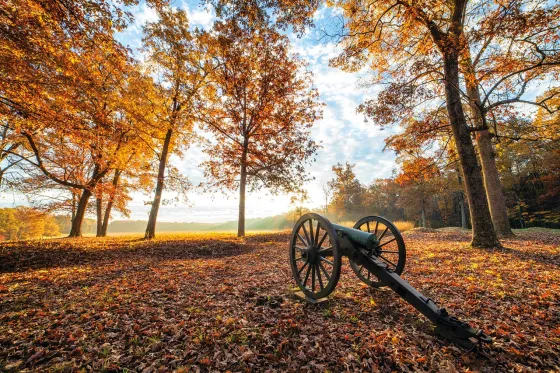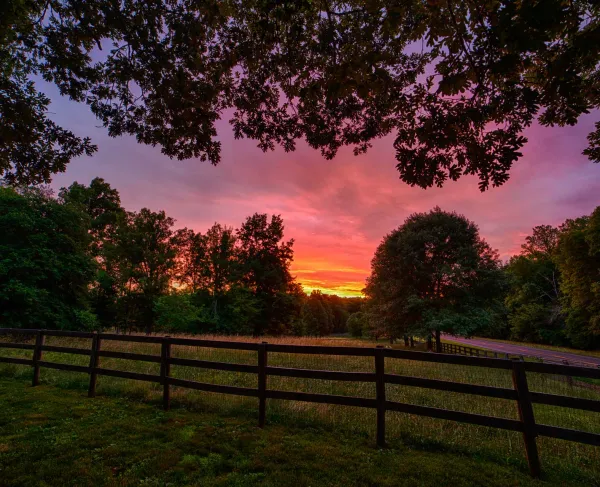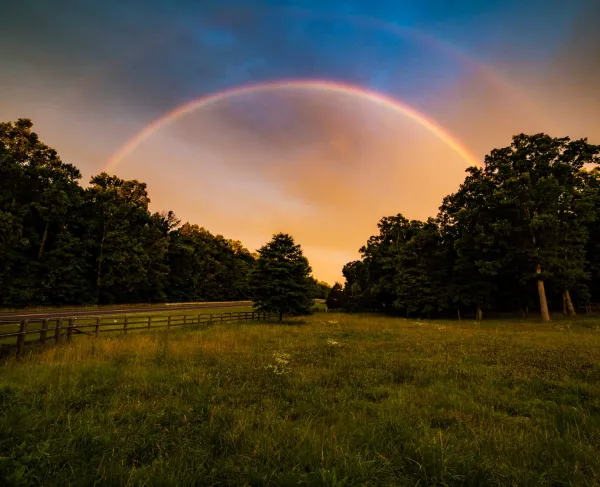American Battlefield Trust Appeals Controversial 'Wilderness Crossing' Development
Mary Koik, (202) 367-1861 x7231
Jim Campi, (202) 367-1861 x7205
(Orange, Va.) — Together with local nonprofits and private citizens, the American Battlefield Trust has filed a legal challenge in Orange County, Va., against a mega-development that would blanket a historic landscape with more than 2,600 acres of residential, commercial and industrial development, including data centers and distribution warehouses. The filing, made in Orange County Circuit Court, identifies a host of substantive and procedural flaws with the development project and the County’s approval, requiring its invalidation.
“In granting the Wilderness Crossing Application, the Board gave a blank check to undisclosed interests to intensely develop, over several decades, hundreds of acres of forested, undeveloped land adjacent to the Wilderness Battlefield for industrial, commercial and residential uses,” the legal challenge states. The rezoned area directly abuts battlefield land on which the May 1864 struggle raged, and includes hundreds of acres within that battlefield’s “study area,” an area representing the historic extent of the battle as it unfolded across the landscape, including where soldiers maneuvered and deployed, and historic and archaeological resources.
“To approve a project of this scale and magnitude without conducting analysis of the impacts to the hundreds of surrounding acres of protected historic landscape is unacceptable, as was the County’s complete lack of response to repeated requests by the preservation community and the National Park Service to meet and discuss our concerns,” said American Battlefield Trust President David Duncan. “As we have before, the Trust and its members will take a stand on behalf of history at the Wilderness.”

Approved despite overwhelming opposition expressed during the public comment hearing and voted on the same evening it first appeared on the Board’s agenda, the project represents, by far, the largest rezoning in Orange County history. All told, it could result in up to 5,000 residential units, and more than 800 acres of commercial and industrial development, as much as 750 acres of which could be data centers and distribution warehouses.
The plan voted on by the Board of Supervisors differs significantly from what was discussed and advanced by the Planning Commission earlier this year. Major changes, including the lifting of a cap on the amount of square footage proffered for data center and warehouse distribution development — previously limited to 5 million square feet — were submitted during the hearing, which took place at the earliest possible time after the Planning Commission’s action. Moreover, Board members went so far as to enter into non-disclosure agreements with unidentified interests, the parties and terms of which have also been concealed. Freedom of information failings, including lack of proper notice of Board meetings and refusal to disclose materials bearing on the rezoning, even to the Planning Commission, are among the many legal flaws in the rezoning approval process.
“The Board of Supervisors failed over and over to conduct a good faith, transparent, and thorough process. They put the interests of a single developer over the express wishes of their constituents and, in their efforts to do so, violated County and State laws designed to ensure fair consideration of such proposals,” said Duncan. “We believe that the courts will see the same haphazard process and patterns of secrecy that we have experienced.”
The challenge further identifies failures to provide sufficient analysis on a host of issues, ranging from noise pollution to water quality degradation — a critical oversight, given the known mercury contamination caused by 19th-century mining practices on this site — to traffic impact. At full build-out, the project would add at least 60,000 vehicle trips per day to the already congested roadways in the Wilderness Gateway area. The plan also advances a long-envisioned realignment of the Route 3 and Route 20 interchange at the border with Spotsylvania County, which would have still further detrimental impacts on the Wilderness Battlefield, including core lands owned by the American Battlefield Trust and other conservation organizations, as well as the adjacent Fredericksburg and Spotsylvania National Military Park.
In filing the challenge, the Trust is joined by the nonprofit Central Virginia Battlefields Trust, Inc. and Friends of Wilderness Battlefield, Inc., all three of which own or steward historic properties in immediate proximity to the rezoned land and stand to suffer significant adverse impacts from the proposal. Private citizens whose homes directly abut the site and face catastrophic consequences also joined as plaintiffs.
This is not the first high-profile conservation challenge associated with the Wilderness Battlefield. Beginning in 2009, preservationists opposed a development proposal that would have seen a Walmart Supercenter built at the intersection of Route 3 and 20 – next to the area threatened now. Ultimately, a win-win scenario resulted in the retailer donating the site for conservation and building its store further west on Route 3. Following the dispute, the Wilderness Battlefield Coalition produced the Wilderness Battlefield Gateway Study, a 2012 report envisioning a viable development path for the region. It was embraced by local residents, park advocates and county officials alike – and many of its recommendations were adopted by Orange County in its Germanna-Wilderness Area Plan. However, these mutually agreed upon principles have been abandoned in the Wilderness Crossing development proposal.
The American Battlefield Trust is dedicated to preserving America’s hallowed battlegrounds and educating the public about what happened at those sites and why it matters today. The nonprofit, nonpartisan organization has protected more than 56,000 acres associated with the Revolutionary War, War of 1812 and Civil War across 155 sites in 25 states. Learn more at www.battlefields.org.






